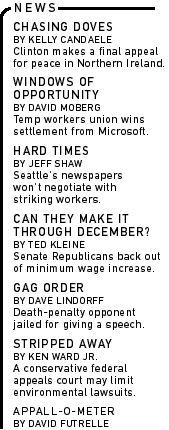 
|

|

|

|
| |
 |
|
|
In my last column, I noted four distinct components of the left: the movements for social justice, the environment, economic justice and peace. I argued that while these groups, when at their best, are united in their opposition to multinational corporations (and to the conservative culture that moves in lockstep with them), a unifying movement of the left must offer more than a common enemy. It must define a positive vision. I believe such a vision would be guided by three principles: a belief in equality and fundamental fairness; a conviction that the widening gulf between the rich and poor threatens our social fabric; and an understanding that corporate capitalism threatens democracy. Most Americans believe in fairness. Indeed, fairness is so deeply ingrained in our social fabric that blatant inequality is difficult to justify. When those in power discriminate against a group, they dehumanize them. For example, when men denied women the vote, they did so on the belief that women were not complete humans--that they were not competent enough to handle the responsibility. But those of us on the left are not only for fairness and equality, we believe that inequalities must be redressed and that we must build a society where equality is an everyday reality. Each of the popular movements on the left struggles to overcome inequity. Within the social justice movement, the NAACP continually supports efforts for equality of access to housing, capital and credit. Similarly, within the arena of economic justice, "living wage" campaigns like EBASE here in Berkeley and Oakland seek to redress wage and benefit inequities. Peace advocates protest the inequities inherent in the military budget. For each 50¢ the U.S. spends on the military, it spends 6¢ on education and 4¢ on health care; if the military budget were reduced by 20 percent--a safe amount according to experts--spending on education and health care could double. When environmentalists protest against a toxic waste dump like the Umatilla Chemical Depot in Hermiston, Oregon, which leaked sarin and mustard gas in September 1999, they are not only protesting the dump itself, but also the tendency of the powerful to foist off society's waste on the poor. The environmental movement has expanded the contemporary notion of fairness by broadening it to include respect for all planetary life. A typical campaign for equality passes through three phases. In
the legal phase, the battlefront is "equal protection under
the law," the right to vote or the right to a comprehensive
education, for example. In the identity phase, the struggle is over
changing the way the dominant culture perceives those who have been
denied equality And it is here that most of the left gets bogged down. Despite the overall progress that women have made, they are still paid less than men. Despite the expansion of civil rights, Latinos and African-Americans are still disproportionately poor. Inevitably, the struggle for equality runs into the harsh reality of the class divide. Economic fairness is difficult to achieve, despite our commitment to that ideal, and the gap between the rich and poor continues to widen. But we cannot achieve true equality until we do something to remedy the increasing differences in wealth and power. In recent times we have tended to be fragmented by a focus on single
issues. Such a focus prevents us from addressing the economic component
of equality. Furthermore, we fail to separate policy from values.
In the same way that multinational corporations are fostered by
a conservative culture, economic equality is fostered by a progressive
culture. However, we have failed to consider the relationship between
values and progressive ideology. I will begin to explore this subject
in my next column.
|

